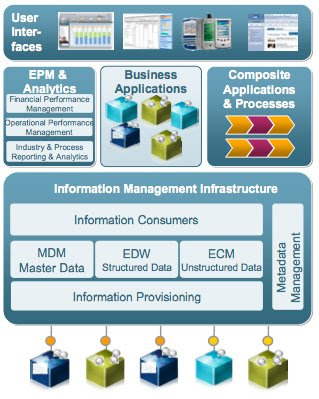
Lyndsay Wise published last month two articles about Enterprise Information Management in Dashboard Insight. In the first article, she provides an overview of information management and in the second article, she looks the Business Objects/SAP view of EIM.
She said that whether it is called enterprise information management, data management, or information management, the general understanding is that managing information across the organization includes the concepts of data governance, data integration, data quality, and master data management.
The Basics Of Information Management

According her, Enterprise Information Management (EIM) is gaining momentum. Organizations are hard pressed to find ways to adequately manage their data without affecting production systems and operational processes.
Enterprise information management takes MDM and other data related initiatives to the next level by enabling organizations to manage their data across sources, ensure a level of quality at each stage of the integration process, and enable organizations to govern the various processes that are associated with the various data points.
With a unified view of data, organizations no longer see separate views of that result from business units, but see how they relate to the overall picture of performance as well.
Data quality adds the final touch to the integration and beginning of MDM mix. To maintain these initiatives, information constantly needs to be validated to preserve valid and accurate data being entered into and moved across various operational systems and within multiple data stores.
This expansion of how data is managed across the organization will continue to converge. Organizations will begin to look at data management as an overall solution that includes integration and data quality initiatives as an extension of current MDM related projects.
Organizations are clearly starting to move towards EIM. Part of this means not only adopting an EIM solution but adopting a data governance framework which includes developing a process for managing data and having a committee of stakeholders that help define taxonomy, hierarchy, etc. and managing these processes across the organization.
The concept of a holistic approach to data management enables organizations to develop end to end solutions that take into account disparate business units and how the data processed within those units translates into valuable information at different touch points across the organization.
I think with the complexity of the companies nowadays, the necessity of information management is increasingly important to enable the companies to manage their data effectively, transforming data into valuable information to make better decisions.
The Role of Data Quality With The Business Objects/SAP EIM Platform

About the approach of the Business Objects, she said that is to combine their data services for data integration and data quality. This removes a barrier of cleaning and integrating data separately and creates a single environment. The solution works by identifying how a change in the source system will affect the various processes and give users the ability to look at calculations and identify where numbers come from, which expands confident decision making based on data as well as compliance and audit requirements.























No comments:
Post a Comment